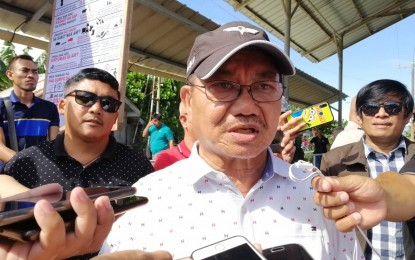
Mindanao Development Authority Secretary Emmanuel Piñol. (PNA file photo)
DAVAO CITY – Mindanao leaders are clamoring for Congress to review the rice tarrification law, which allows unimpeded rice importation, amid the tanking farm gate prices of paddy rice, Mindanao Development Authority (MinDA) Secretary Emmanuel Piñol said Wednesday.
In a statement, Piñol noted that the farm gate prices of paddy rice have dropped from an average of PHP22 per kg. two years ago to just PHP11 per kg. since Republic Act 11203, or “An Act Liberalizing the Importation, Exportation, and Trading of Rice”, was enacted late last year.
He said MinDA's governing board has recently passed a resolution unanimously urging both the House of Representatives and the Senate to review and amend the law, which allows the unimpeded entry of imported rice into the country.
MinDA's governing board includes Senator Juan Miguel Zubiri, Bangsamoro Autonomous Region in Muslim Mindanao (BARMM) Chief Minister Ahod Murad Ebrahim, as well as House lawmakers, governors, and mayors who head the Regional Development Councils (RDC), and private sector representatives in the island region.
The resolution, Piñol said, was proposed by private sector representative Sherwin Begyan and seconded by Agusan del Norte Governor Dale Corvera "without any opposition."
He said the measure called for the "review of the Rice Tariffication Law (RTL) in the face of irrefutable evidence that the unimpeded rice importation has caused injury to the local rice industry and the rice farmers of Mindanao."
“The resolution was presented during the MinDA Governing Board meeting as among the issues and problems, which could affect Mindanao's economic recovery following the coronavirus pandemic,” Piñol said
During the discussions, he said, MinDA's board members took note of the "very low farm gate prices of paddy rice," reaching as low as PHP11 per kg., which is less than the production cost of PHP12.
This has caused economic hardships for rice farmers and could adversely affect Mindanao’s economic recovery efforts, Piñol said.
Zubiri, whose home province of Bukidnon has one of the biggest rice production areas in Mindanao, also received appeals from rice farmers for a review of the RTL.
"If it is really causing injury to the rice industry and hardships to our farmers, then it is only fair that we review the law," Zubiri was quoted as saying by Piñol.
He noted that while the RTL aims to provide affordable rice prices for consumers, coupled with the goal of raising the income of palay or rice farmers, the law also allows importers "to bring in as much imported rice, provided they pay the tariffs, which in turn will be placed under the Rice Competitiveness Enhancement Fund (RCEF), which assures the rice industry of PHP10 billion annual support for the next six years."
Piñol, however, said studies conducted by the Federation of Free Farmers showed that while rice consumers benefited from the lower rice prices at an estimated value of PHP6 billion, rice farmers lost about PHP80 billion because of reduced income as a result of very low farm gate prices.
“Additional losses, which have yet to be quantified were also reported in ancillary activities to rice production, including land preparation equipment utilization, milling, and processing, and by-products like rice bran and rice hulls,” he said. (PNA)
